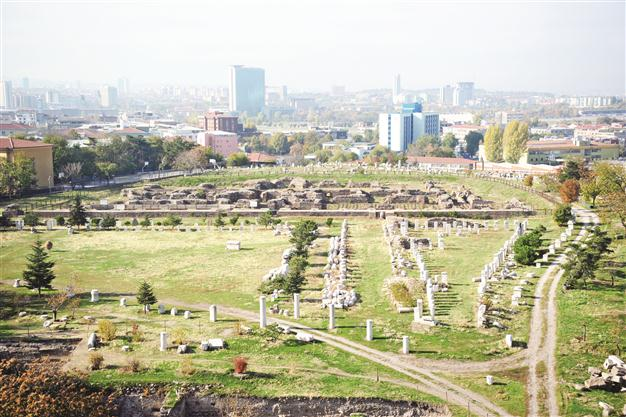Centuries-old Roman theater to again welcome public in capital

The theater will become a tourist attraction and host cultural and artistic events when the restoration work is completed, Acar said, adding that the structure’s restoration was part of a larger project that would allow Ankara to acquire the share of the tourism market it deserves. AA photo
An ancient Roman theater in Ankara will soon be open to visitors following the recent restarting of excavations after a hiatus of more than two decades.
“The ancient Roman theater is one of the most important finds in the city,” Doğan Acar, Ankara provincial culture and tourism director, recently told Anatolia news agency.
The theater will become a tourist attraction and host cultural and artistic events when the restoration work is completed, Acar said, adding that the structure’s restoration was part of a larger project that would allow Ankara to acquire the share of the tourism market it deserves.
As part of an Ankara Castle Action Plan, the governor’s office and the municipality have begun work at the Hacı Bayram-ı Veli Mosque and historical Hamamönü around the castle, the director said.
“Now, infrastructure works are continuing at the castle. As part of this plan, the Anatolian Civilizations Museum is carrying out the excavations at the Roman theater,” Acar said.
Over 1,800 years oldThe projects to restore the theater in preparation for opening it to the public are currently being evaluated at the Ankara Committee for the Conservation of Cultural Artifacts.
The Roman theater was partially unearthed during excavations carried out under the leadership of the Anatolian Civilizations Museum and with the consultancy of faculty of the Ankara University’s department of classical archaeology, according to information provided by the Anatolian Civilizations Museum.
The structure is located in the southeastern area of the Temple of Augustus and Rome. The 50-by-43.5-meter structure is thought to have been constructed in the second century A.D.
No excavation work was conducted in the ancient theater between 1986 and 2009; only superficial cleaning work was carried out at intervals. The theater area had turned into a garbage site during this period.
In 2009 a team including six archaeologists restarted excavations in the theater under the leadership of the Anatolian Civilizations Museum.
Three buildings, which had been built on the theater area and prevented excavation, were demolished in collaboration with the museum and the Ankara Metropolitan Municipality.
Excavations that continue six months out of the year have been financed by the General Directorate of the Cultural Artifacts and Museums.
The theater is believed to have had a capacity of 3,000 to 5,000 people. The eastern and western entrances of the theater were covered with big blocks and turned into a water pool in the late Roman and early Byzantine period.
Artifacts that have been found at the ancient theater during excavations are being exhibited at the Anatolian Civilizations Museum.
Ceramics and glass pieces from the Romans have also been unearthed during the recent excavations.
